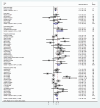The role of diabetes mellitus on delirium onset: a systematic review and meta-analysis
- PMID: 40390076
- PMCID: PMC12090660
- DOI: 10.1186/s12933-025-02782-w
The role of diabetes mellitus on delirium onset: a systematic review and meta-analysis
Abstract
Background: Delirium may develop in association with an underlying cardiovascular or cerebrovascular disease and complicates one out of three medical admissions representing a significant economic burden for healthcare systems. However, a clear relationship between delirium onset and diabetes mellitus has not been clarified. The purpose of this study was to explore the association between DM and delirium with the following aims: (a) to assess the incidence of delirium among DM patients (b) to assess the risk of delirium onset in patients with DM (c) to assess the role of anti-diabetic drugs on delirium onset.
Methods: MEDLINE, Scopus, and Web of Science and ClinicalTrials.gov were searched from inception up to 30th of December 2024. Studies reporting the incidence of delirium in diabetic patients, delirium events in diabetic patients compared to non- diabetic patients, and the role of antidiabetic drugs on delirium development were considered.
Results: The pooled incidence of delirium resulted 29% (95% CI 26.0%- 33.0% I2 = 99.6%). The OR for developing delirium resulted: 1.78 (95% CI 1.59-1.99 i2 = 88.3%) Intranasal insulin administration compared to placebo groups was characterized by a RR = 0.34 (95% CI 0.23-0.52). Metformin use compared to non-metformin use in diabetic patients was characterized by lower RR for delirium: pooled RR = 0.71 (95% CI 0.59-0.85, I2 = 84.8%).
Conclusions: The incidence of delirium in patients with diabetes is about 29% and patients with diabetes have higher odds of delirium. Chronic use of metformin, and intranasal insulin administration before surgery may offer benefits in the prevention of delirium. These findings are characterized by significant heterogeneity which hampers their interpretation. Future research for developing diabetes-specific delirium screening protocols, and evidence-based preventive interventions is needed.
Keywords: Delirium; Diabetes mellitus; Elderly; Insulin; Metformin.
© 2025. The Author(s).
Conflict of interest statement
Declarations. Ethical approval and consent to participate: Not applicable. Consent for publication: Not applicable. Competing interests: The authors declare no competing interests.
Figures
References
Publication types
MeSH terms
Substances
Grants and funding
LinkOut - more resources
Full Text Sources
Medical





